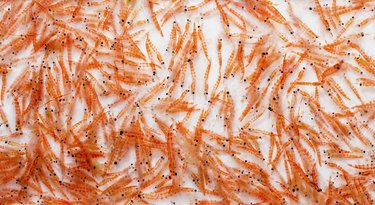
Krill oil generates a lot of media attention as an alternative to omega-3 fish oil. The American Heart Association recommends 1,000 milligrams of omega-3s to help control high blood pressure and other heart disease risk factors. Krill contains omega-3s, and the claim that krill omega-3s are better than those found in fish oil has merits. However it's important to seek your doctor's advice if you're considering krill oil for blood-pressure-lowering benefits.
The Difference
Video of the Day
It's helpful to understand the difference between fish and krill omega-3s. In a sense, krill is a more natural source due to the marine food chain. Algae lies at the bottom and contains omega-3 in the form of EPA or eicosapentaenoic acid. Krill, which is a small shrimp-like crustacean eats the algae, digests the EPA and synthesizes a new form of omega-3 called DHA or docosahexaenoic acid. In turn, krill is the main food source for thousands of marine animals and provides fish with both EPA and DHA.
Video of the Day
Krill Superiority
Researchers in the February 2007 issue of "Nutrition Reviews" performed an analysis of the nutritional value of krill oil compared with fish oil. The chief difference is that krill oil omega-3s are in the form of phospholipids, while fish oil omega-3s are in the form of triglycerides. The type the body uses is phospholipid, and phospholipids provide the building blocks for virtually every cell in the body. Thus krill omega-3s have greater bioavailability for maintaining heart health. Further, krill has naturally occurring astaxanthin which is proven to be a powerful antioxidant.
Preventing High Blood Pressure
Hundreds of published studies have shown benefits from supplementing omega-3s for lowering blood pressure. Physicians reporting in the August 2009 issue of "Journal of the American College of Cardiology" expressed frustration at the wide spectrum of dosages used in terms of how best to advise their patients. So they reviewed the most rigorously controlled studies to form a consensus. This group of physicians concluded a daily dose of 500 milligrams combined EPA and DHA is effective for prevention of high blood pressure. However it's important you seek your doctor's advice as he or she knows what's best for you.
Krill Oil Peptide
A study reported in the May 2009 issue of the "Journal of Food Science" found a significant blood pressure lowering effect from krill oil on rats. The researchers extracted a peptide from oil located in the tail section and when they fed it to rats, it produced an immediate drop in the animals' blood pressure. The peptide naturally occurs in any whole krill oil supplement. So krill oil not only provides the hypertension benefits associated with fish omega-3s on a more bio-available basis, but also may pack some more punch in the form of a peptide.
Warnings and Side Effects
You should not take krill oil if you are on blood-thinning medications, as the oil may enhance the effects of the medication. Other medications that can be affected by krill oil intake are beta-blockers, diuretics, anti-inflammatories, orlistat and diuretics. Krill oil may also affect medications with estrogen such as birth control or hormone replacement therapies. Speak to your doctor before taking krill oil if you are on any medication.Side effects of krill oil may include flu-like symptoms, fever, back pain, irregular heartbeat, rash and fishy burps. There is not enough evidence to confirm fish oil is safe during pregnancy, so it is best to avoid it.
- Circulation: American Heart Association Scientific Statement; Fish Consumption, Fish Oil, Omega-3 Fatty Acids, and Cardiovascular Disease
- National Geographic: Animals: Krill
- Journal of the American College of Cardiology: Omega-3 Polyunsaturated Fatty Acids and Cardiovascular Disease
- Journal of Food Science: Isolation and Identification of Antihypertensive Peptides from Antarctic Krill Tail Meat Hydrolysate
- Family Doctor: High Blood Pressure: Things You Can Do
- Drugs.com: Krill Oil